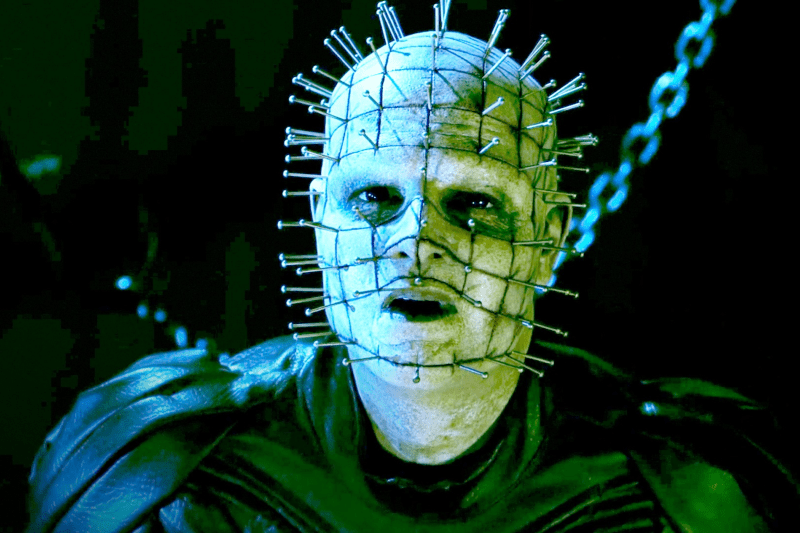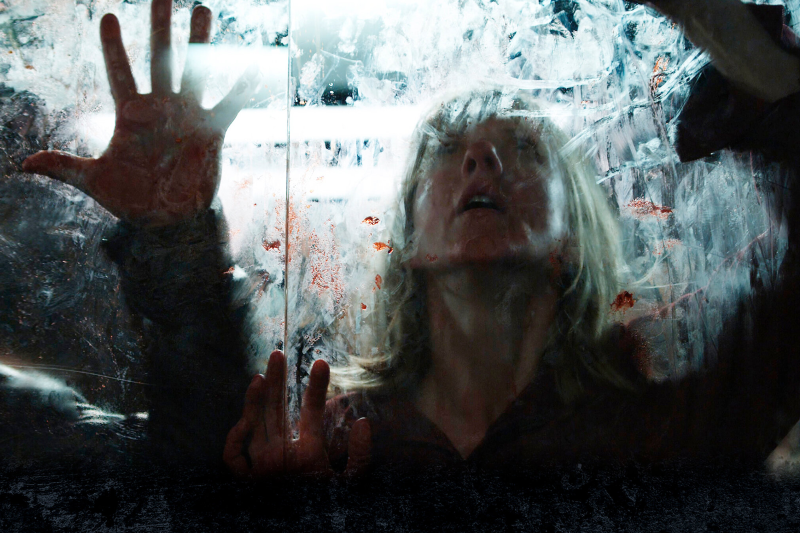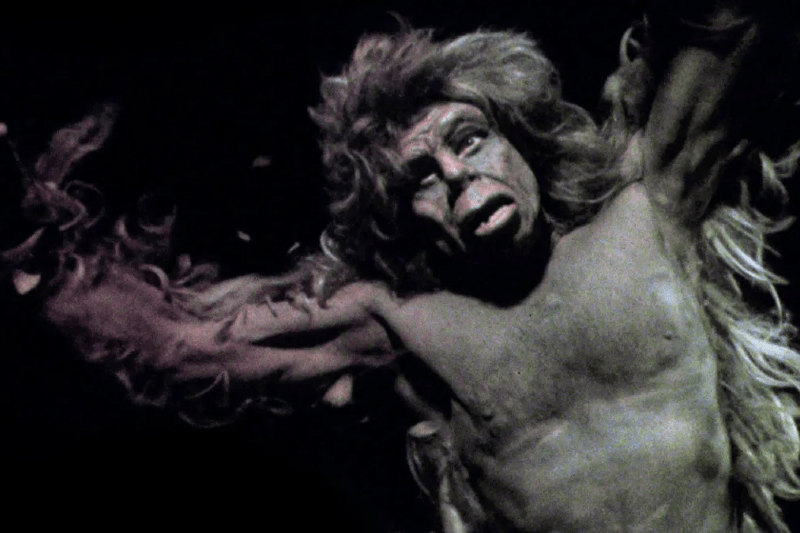Horror villains that touch upon elemental fears lend themselves to endless reinterpretation. Among recent horror icons, Pinhead stands out as a character capable of reaching the greatest heights of the monster pantheon alongside icons like Dracula and Frankenstein. No matter how cheap the production is around him, Pinhead’s presence stokes cautionary fears of the dangers of excess in his audience. Even at his reputedly lowest point, 2011’s Hellraiser: Revelations, the strength of Pinhead’s concept as a character allows him to transcend the limitations of a contentious production.
Upon its release in 1987, Hellraiser proved instantly iconic. Douglas Bradley’s performance as Pinhead added an ineffable quality of malice to the outré character design of the demon devoted to pleasure and pain. Created as homage to the underground gay S&M scene in 80s London, Pinhead’s look and indulgences instilled a sheen of taboo to a genre already beset by attacks from conservative audiences in the Video Nasties era. Even after the culture milieu that birthed him passed, Pinhead lingered on, capturing the hearts of subsequent generations of genre fans. Much of the franchise’s appeal appeared to rest on Bradley’s capable performance as the spikey-headed antihero. The actor became as much part of the series’ appeal as its main antagonist.
However, as the years went on the franchise was beset by diminishing returns and faced an existential crisis in 2011. With the expiration of their rights to the character looming, the Weinstein Company hurried a new sequel into production in lieu of creating a proper remake. The film was completed in less than three weeks. The results drew the ire of Hellraiser visionary Clive Barker. He publicly and profanely ridiculed the picture. Bradley declined to return to his iconic role and dismissed the film. In his estimation, the filmmakers were not making a serious attempt to resurrect the franchise. Pinhead’s relevance faced its first real test: could the character survive the departure of the actor that made him iconic?
Moviegoers answered in the negative, revolting against what many viewed as a cash-grab. Revelations received a laughably low 2.7 rating on IMDB. The few critics that did review the film cited Bradley’s absence as a major drawback. However, many longtime fans dismissed the picture because of their outrage over Bradley’s departure without engaging with it on its own merits. While undoubtedly flawed, Revelations possesses many of the qualities that drew audiences to the franchise in the first place. Chief among these is Pinhead’s chilling presence.
Revelations screenwriter Gary J. Tunicliffe previously worked on the Hellraiser franchise as a makeup artist. Given his professional background, viewers might have expected the first-time screenwriter to focus solely on Hellraiser’s gory excesses. Instead, Tunicliffe devised a solid premise. Revelations’ scenario plays like The Exterminating Angel meets Pinhead, which gives the monster a solid showcase for his particular strengths.
The plot concerns the Craven and Bradley families meeting for dinner to mark the one-year anniversary of their respective sons’ disappearances while on a trip in Mexico. During the course of the evening, Emma Craven discovers a puzzle box among her missing brother’s affects and unwittingly unleashes Pinhead and his minions.
As the Cenobites make their presence known, the Hell dimension’s magic cuts off communication with, and access to, the outside world. The Cravens and Bradleys’ desperation increases as the hopelessness of their predicament sets in. In true Hellraiser fashion, no victim is entirely innocent. As the families begin to turn on each other, their darkest secrets are revealed. Before a chain hook can rip apart a throat, their simmering tensions boil over, ultimately sealing their fate.
Whether this premise succeeds or not depends entirely on the menace of the Cenobites. Thankfully, director Victor Garcia chose to pour much of the film’s paltry budget into makeup effects, doing the demons justice. The harried production put every hurdle possible in the way of Revelations, and yet the pleasure demons overcome Revelations behind-the-scenes limitations to deliver the genre thrills fans’ crave.
While Revelations conjures up some of Hellraiser’s horror magic, its detractors are not entirely wrong. Inarguably, Stephan Smith Collins, the actor who stepped into the role of Pinhead, lacks Bradley’s poise and somberness. When his voice proved less-than-intimidating, another actor, Fred Tatasciore, dubbed Collins vocals to add a layer of menace. Despite these drawbacks, Collins’ turn as Pinhead still leaves an impression. His leering presence, at home among the gore-laden hooks of the Hell-dimension Pinhead calls home, hits with maximum impact when presented in the Cravens’ bourgeoisie living room. Once the blood begins to flow, Pinhead’s otherworldly presence makes the unfolding horrors linger well after the credits roll.
Therein lies the power of the Hellraiser franchise. The taboos the Cenobite represent escape from the margins of our culture and seep into our daily lives to disrupt the fictions of respectability we strive to maintain. Collins imbues Pinhead with the requisite zeal for punishment that makes the character a dark mirror of our own worst impulses. While Collins’ performance may not go down as an all-time great, it proves that Pinhead’s appeal is bigger than the actor portraying him. Fans that were quick to dismiss the picture should re-evaluate its ranking among Hellraiser’s numerous sequels. The terror of Barker’s original conceit shines through the cheap effects and amateurish production, making a strong case for Pinhead as one of the great, archetypal horror villains. Like Dracula or Frankenstein, the elemental horror Pinhead represents remains undiminished despite being rushed, monetarily restricted, and hobbled by ill studio intent.
Revelations manages to touch upon the universal fear that underpins Barker’s premise. If new iterations of Hellraiser can reinterpret Barker’s allegory in a way that speaks to our own fraught times, the franchise can free itself from direct-to-video purgatory and return to the forefront of horror cinema. Though imperfect, Revelations proves that Pinhead has the staying power of the great cinematic monsters. Even if these new reboots fail, it won’t belong before other creatives find themselves drawn to the property. Like Pinhead’s victims, the allure of Cenobites’ parable will prove too great for creators to let old demons ever die.







